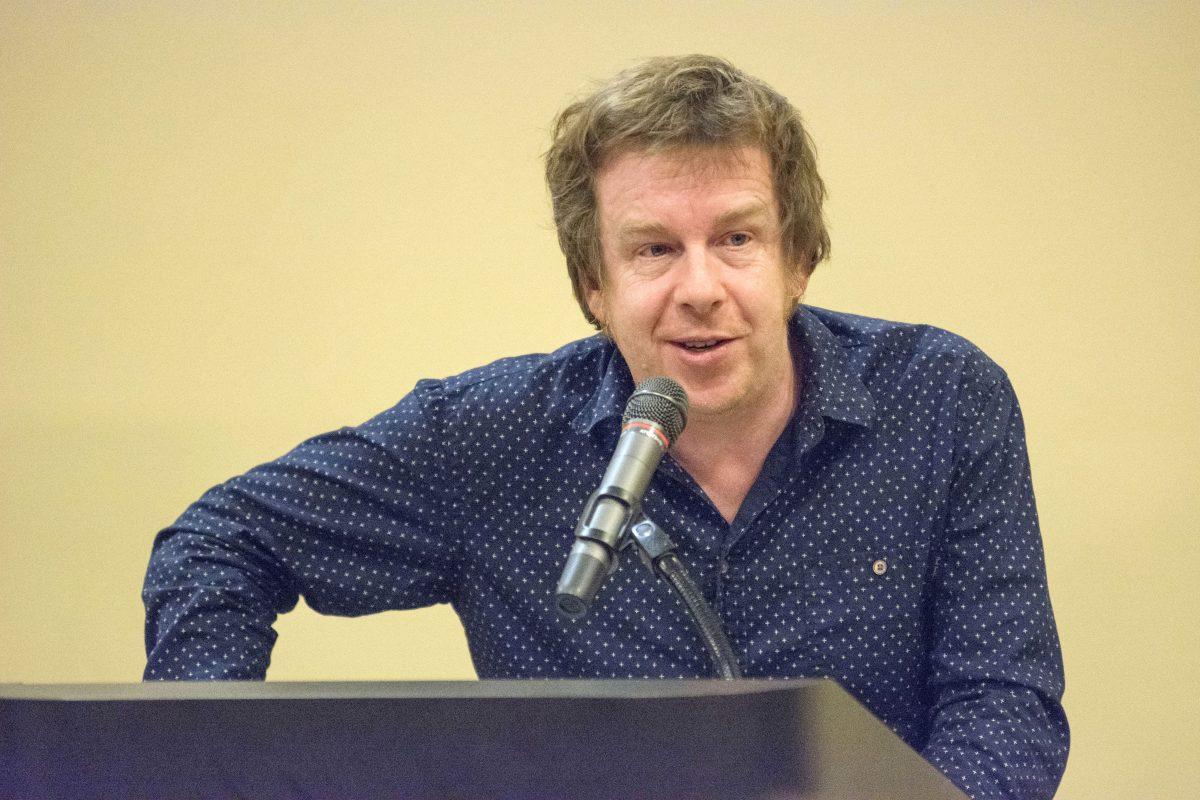New York Times best-selling author and Irish journalist Kevin Barry read from his selection of short stories and his novel, City of Bohane, as part of the N.C. State Literary Readings program. The English Department’s creative writing program hosted the event in Caldwell Lounge on Wednesday.
Author of Lookaway, Lookaway and creative writing professor, Wilton Barnhardt, introduced the accomplished Irish writer, claiming Barry’s dystopian novel City of Bohane is what movies should be like and that it should be one.
Barry started the evening with a few jokes after asking the audience, “On a scale of one to 10, how much filth can you handle?” Receiving an overwhelming response of 10, he pressed on in reading his short story, “The Fjord of Killary.” This tale, laden with sarcasm and blunt thoughts, had the crowd chuckling and hanging on to every word.
“That was just a tender little story to soften you up,” Barry said, with a sly smile.
Set in the near future of 2050s, Bohane is a city on the western seaboard of Ireland. Barry said he created the setting based on the western Ireland cities of Cork and Limerick, where he spent his childhood. Although it has a futuristic feel, the novel is influenced by Barry’s love for classic western novels and traditional Irish folklore.
The change of tone and character in his voice while reading the dialogue of each character transported the crowd to a shack in Bohane circa 2050s. His reading voice pulled the listener into his future dystopian city, yet Barry came back into his own being and kept the audience smiling and engaged with the Irish native.
Ellen King, graduate in creative writing, said she loved Barry’s reading, and he had a liveliness to reading that invites people into his specific world.
After his reading, Barry took questions from the audience about his writing and his influences. His biggest literary influence for Bohane was A Clockwork Orange and references shows such as The Sopranos and The Wire as inspirations for conflict in the novel. Barry said he believes some of the best narrative fiction has moved from novels into television.
Barry offered great advice based on his own experience for aspiring writers.
“The most sure-fire way of getting the words down right away is to write first thing in the morning so you don’t have an excuse or get distracted,” Barry said. “Don’t go online or pick up your bloody iPhone. I don’t even drink coffee first thing because I don’t want to get too awake.”
Barry did not come to this realization early on in his writing career, but said, “In my early twenties, I was a 4-in-the-morning writer after crawling back home.”
The Irish author stressed the importance of feeding your writing style by reading.
“Never feel guilty about spending time reading,” Barry said. “It’s all food — it’s all inspiration.”
The writing process has not always been successful for Barry, as he acknowledges the majority of what he writes will not be that great. He said his philosophy about writing differs from others because he persists to the finish line.
“Even if I know this is crap, I’m going to finish it,” Barry said. “It’s mostly a professional thing, but I always save it for a month or two and pull it out later to see if anything is worth while in it.”
Although it can be frustrating, Barry said he continues writing because of the joy he gets from the process.
“I love that initial spark a writer gets with a story and thinking this is going to be great,” Barry said. “The most important thing is that you keep having those ideas.”
The accomplished writer also stressed the importance of not giving up in writing.
“You can always write,” Barry said. “No matter what mood, shape or condition you are in. It’s a great place to be when you get there. You go through a lot of wrong avenues trying to find your style and voice. You have to write your way through a lot of influences and stuff to find your own stuff. “
Kevin Barry has penned three collections of short stories, the first titled Town and Country: New Irish Short Stories, the second There are Little Kingdoms: Stories and the most recent Dark Lies the Island: Stories. His novel City of Bohane won The European Union Prize for Literature and is currently being worked into a television or film screenplay by a producer in London.








